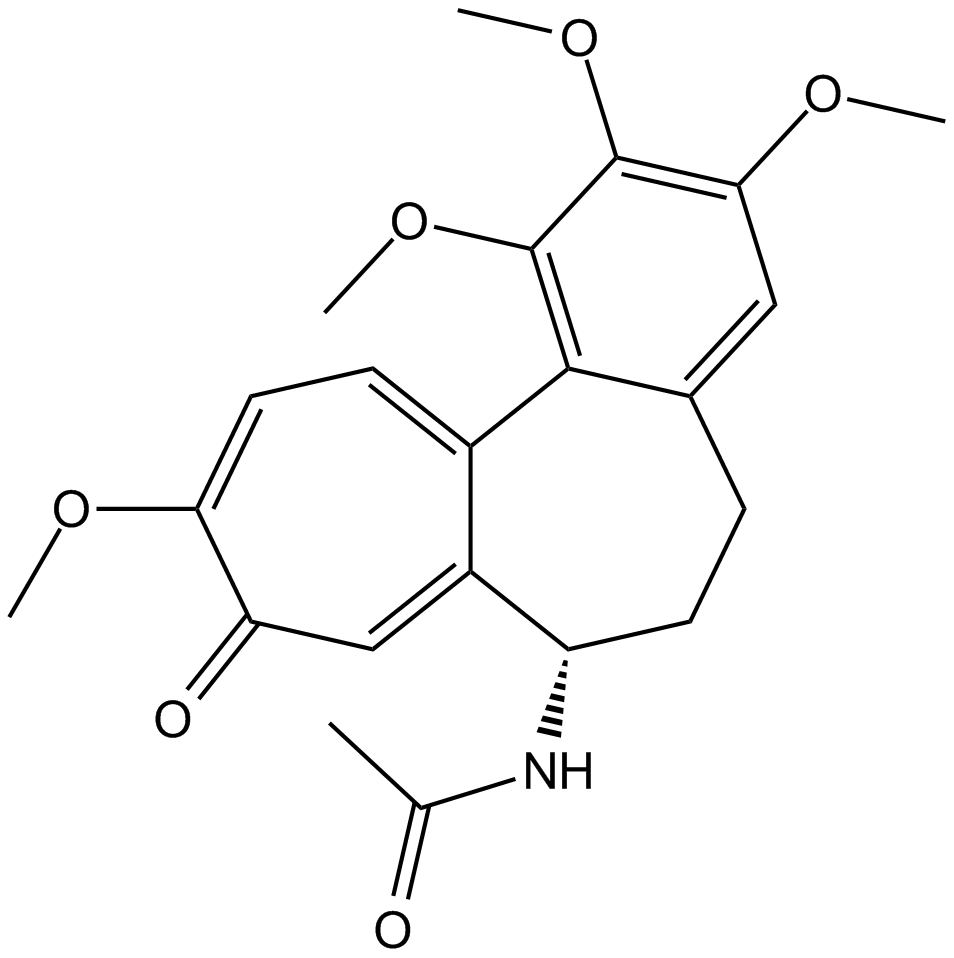Colchicine |
| Catalog No.GC13261 |
An inhibitor of microtubule polymerization
Products are for research use only. Not for human use. We do not sell to patients.

Cas No.: 64-86-8
Sample solution is provided at 25 µL, 10mM.
Colchicine, a tubulin inhibitor, which block polymerization of microtubules by binding to tubulin (IC50 = 3.2 μM).
Tubulin is one of several members of a small family of globular proteins. The tubulin superfamily includes five distinct families. To form microtubules, the dimers of α- and β-tubulin bind to GTP and assemble onto the (+) ends of microtubules while in the GTP-bound state.[1] The β-tubulin subunit is exposed on the plus end of the microtubule while the α-tubulin subunit is exposed on the minus end. After the dimer is incorporated into the microtubule, the molecule of GTP bound to the β-tubulin subunit eventually hydrolyzes into GDP through inter-dimer contacts along the microtubule protofilament.[2] This is the GTP cycle which is essential for the dynamic instability of the microtubule.
Colchicine inhibits microtubule polymerization by binding to tubulin, one of the main constituents of microtubules. Availability of tubulin is essential to mitosis, and therefore colchicine effectively functions as a "mitotic poison" or spindle poison.[3] So mitosis can be stopped before it completes near the middle of mitosis (specifically metaphase) in the cell cycle. Apart from inhibiting mitosis, colchicine also inhibits neutrophil motility and activity, leading to a net anti-inflammatory effect in 5 μmol/kg in a mouse model of gouty arthritis and inhibits the deposition of uric acid, a key aspect in the treatment of gout.[4] Side-effects include gastrointestinal upset and neutropenia. High doses can also damage bone marrow and lead to anemia and also cause hair loss.[5]
References:
1. Heald R, Nogales E. "Microtubule dynamics". J. Cell. Sci. 2002,115 (Pt 1): 3–4.
2. Howard J, Hyman A. "Dynamics and mechanics of the microtubule plus end". Nature 2003,422 (6933): 753–8.
3. "Information for Healthcare Professionals: New Safety Information for Colchicine (marketed as Colcrys)". U.S. Food and Drug Administration.
4. Chen LX, Schumacher HR. "Gout: an evidence-based review". J Clin Rheumatol 2008, 14: S55–62.
5. Colchicine. National Institute for Occupational Safety and Health. Emergency Response Safety and Health Database, August 22, 2008. Retrieved December 23, 2008.
Average Rating: 5 (Based on Reviews and 30 reference(s) in Google Scholar.)
GLPBIO products are for RESEARCH USE ONLY. Please make sure your review or question is research based.
Required fields are marked with *




